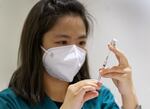Oregonians are continuing to contract COVID-19 at an increasing rate in mid-May. But it’s difficult to say how many people are currently ill because so many people are testing at home or not testing at all, according to public health officials. Hospitalizations – though higher than they were last week – remain at about a third of where they were during the delta and omicron surges, state epidemiologist Dr. Dean Sidelinger said during a press conference Wednesday.
“Unfortunately, these developments tell us that the pandemic is not over,” Sidelinger said. “If you’re in a gathering of people outside your home, sooner or later you will be exposed to the virus.”
Sidelinger urged everyone to get vaccinated and boosted, which he said is the best protection against severe illness and long COVID-19. He also called for people to consider wearing a mask in public indoor settings again, though he was clear there was no state mandate to do so.
While the omicron variant is less severe than past iterations, Sidelinger said the likelihood of getting long COVID remains about the same, according to what is known so far. Current data suggests that about 13% of people have lingering symptoms a month after infection and 2.5% have symptoms three months after, according to the U.S. Centers for Disease Control and Prevention. Of those who are sick enough to be hospitalized, 30% have ongoing symptoms six months later. Sidelinger said the only thing known to reduce the risk of long COVID is full vaccination, which means having gotten an initial dose and any available boosters.

In this OPB file photo, Clackamas Community College nursing student Nina Tan draws up doses at a pediatric COVID-19 vaccine clinic held at Clackamas Town Center, Nov. 10, 2021 in Happy Valley, Ore. Booster shots are now approved for everyone older than five.
Kristyna Wentz-Graff / OPB
First boosters are approved for everyone age 5 and older. Second booster shots are approved and encouraged for everyone over 50, people who are immunocompromised and people who initially received a Johnson & Johnson vaccine. Vaccines have not yet been approved for children younger than 5.
Getting boosted has about the same effect on improving immunity as getting COVID-19, according to laboratory findings by doctors at Oregon Health and Science University. The study has not yet been evaluated by other medical researchers, but one doctor who worked on it said the results could provide another argument for getting boosted.
“Some may ask whether it’s a good idea to just get infected and get it over with. We would not recommend ‘getting COVID-19 to avoid getting COVID-19,’ so to speak,” Dr. Marcel Curlin, the medical director of OHSU Occupational Health and co-author of the study, said in a statement. “Boosters provide as much immunity enhancement as natural infection, so the most practical way to protect yourself and those around you who may be more susceptible to severe infection is to get vaccinated.”
In the future, everyone should expect to receive another booster, Sidelinger said, though he couldn’t yet say with certainty if it would be another dose of the existing vaccine or a reconfigured dose designed to provide a better defense against omicron. With Oregon’s vaccination rate around 76%, most known COVID cases in Oregon were breakthrough cases last month, according to Oregon Health Authority data.
For now, schools have been asked to consider returning to masking. Portland Public Schools this week emailed parents encouraging them to send their children to school with masks.
Sidelinger asked that all Oregonians be respectful of each other’s decisions about how cautious to be as we navigate yet another version of pandemic life in the state.
“Some of us will continue to be more cautious because of our own health or the health of those around us,” Sidelinger said. “Let’s support each other as we move through this phase of the COVID pandemic.”
